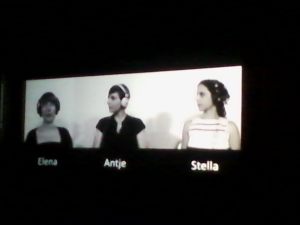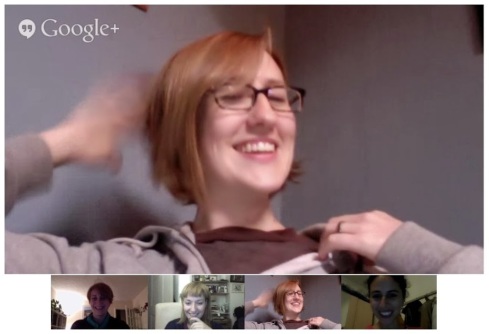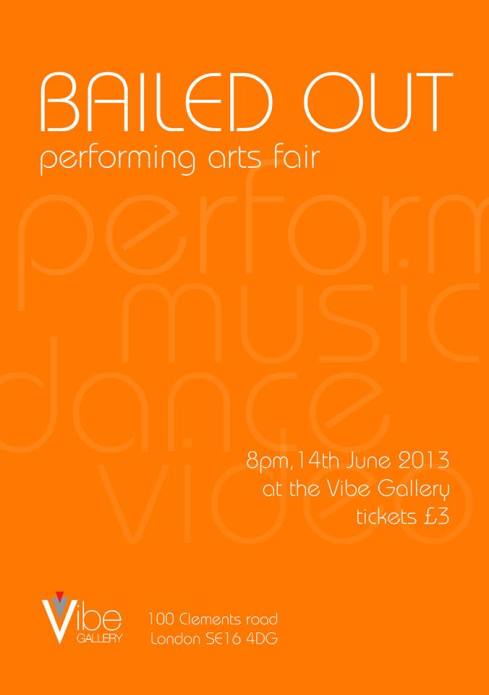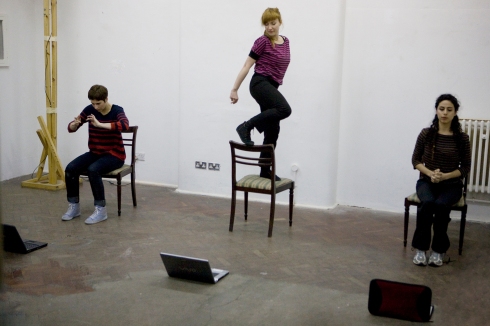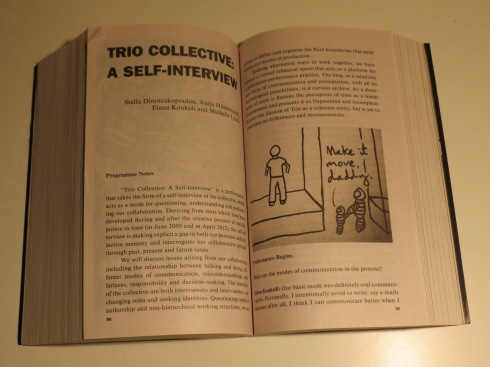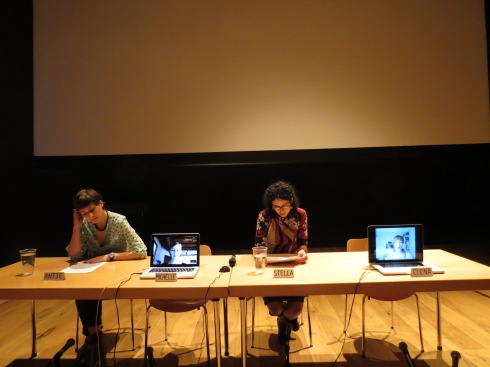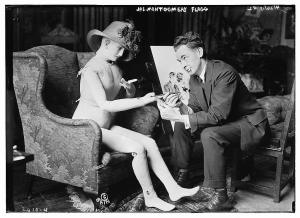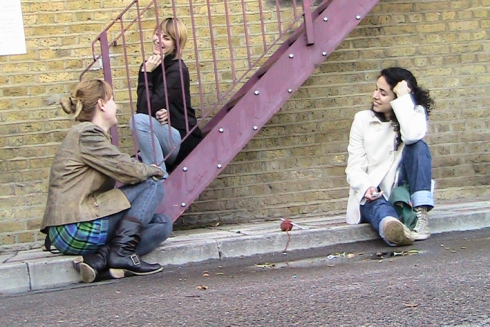What are the modes of communication (in the process)?
Elena Koukoli: E-mails. We are mostly using e-mails and dropbox. We delegate tasks and then we share them with each other through dropbox. We are still meeting and arranging rehearsals but only during the time before shows.
However this is the case just for the three of us, the ‘Londoners’. With Michelle there is skyping and dropbox, yes… a little skyping and dropbox and no rehearsals before shows.
Michelle K. Lynch: The 5371 miles between where I’m based in San Francisco, and London make a big impact. Since I left London in 2009, we’ve transitioned to a virtual space; especially for me, I have been a ghostly collaborator. While Stella, Antje and Elena are able to meet face to face, my communication is mostly email, with Skype conference calls as often as we can. We use a file sharing system – I have a popup feature enabled on my computer, so I see the ongoing Trio activity as messages that appear briefly on the corner of my screen.
Stella Dimitrakopoulou: It’s been 3 years since we were all four together at the same time and space (geographically). Since then we have been communicating a lot through skype, dropbox, yahoo, hotmail, gmail, wordpress and other virtual spaces using videos, texts and live stream videos or calls. When at least two of us were in the same place at the same time we kept meeting in person. The rest were informed later on the outcomes of that meeting, or not.
Antje Hildebrandt: Our modes of communication are virtual and actual, real and fake, individual and collective, online and offline, intimate and alienated, distant and close, critical and silly, live and recorded.
How do you deal with misunderstandings and failures?
M.K.L.: Misunderstandings and failures are a part of the collaborative process, in all ways very small and quite large. Especially when long distance is added, failure of technology makes its mark. I’m thinking of dropped calls and shitty skype connections. When Trio first started, failures were more traumatic to me, but as we have grown they now seem integral. Messiness is more vital for me, and perfection far too boring. I respond to work that does not shy away from its own difficulty coming into being (as well as the being itself). In terms of how we deal with them: we talk and we re-work and then we talk some more. For example, last winter, we were working on re-re-twothousandth-re. I was renting studio space in San Francisco, recording my rehearsals and sending them digitally to the other three in London. The performance was set to be part of Resolution in London, and I was set to fly over for final rehearsals and to perform – finally, Trio could be a quartet like it was meant to be! A few weeks before my slated departure, my stepfather was in a motorcycle accident and his life was being held onto by, well…not too much. He and my mother live on the east coast of the US, and I made the choice to cancel my trip to London and go there instead. His health was too fragile, and my mom was in pretty desperate need of emotional and logistical help. So, Elena, Stella, and Antje rose up out of that failure and shifted the piece to three performers at the last minute. I wonder how they feel about what the piece became out of that failure. Failure of bodies and time and timing. As a side note, Paul’s health is greatly improved. He had what will hopefully be his last surgery last Monday.
S.D.: Misunderstandings and failures are integral to collaboration. It seems that it is not distance that makes things more difficult but rather friction, friction as a result of contact. We‘ve got to know better each other; in this collaboration we are co-workers but also friends. This often makes things easier, but when it comes to misunderstandings it can be very complicated and can result to emotional and personal failures, that cannot but influence the work within the collective. Talking helps, letting time to pass helps, taking distance sometimes helps…
A.H.: A while ago now there was an uncomfortable awakening. One marked by naivety and the impossible notion of neutrality. Wanting to be invisible or at least not be here or there. Close my eyes and hide from the difficulties and conflicts. When happens when work becomes personal? Or is it not already? Where do we draw the line? Which side to stand on when middle ground becomes impossible. Or are we in a triangle and there is no middle ground? And we withdraw and then we pick up the pieces. We continue – despite of what is lost. And so we do do do.
E.K.: I don’t deal well with misunderstandings and failures. I think as a group we ignore them or I mostly ignore them and pretend they are not there. And when they are confronting me I get paralysed. I think I need time to get over the difficulties and then I feel the need to collaborate again, to re- or-co-exist as Trio, although we are four, although we have failed several times to be four.
How are decisions made?
S.D.: We started by discussing on everything together before we decide on something. This was good but very time consuming. Trust is the first step. Trust to the others, when due to time limits it is not possible to discuss on everything before we decide on everything. The next step is to agree on those things that need to be discussed by all before a decision is taken and those that can be trusted to one or two or three, without all needing to be there. What is more important and what is less. It’s definitely easier said than done.
A.H.: I would still say collectively, partly consisting of practical reasoning and partly of conceptual thought.
E.K.: Collectively or individually if there is no time to discuss because of a deadline and a member of the group thinks it’s worth, say, applying for an event.
M.K.L.: Decisions are made through conversation – in virtual and physical space. I have deferred decision-making quite a bit over the past few years, since I have been less actively involved. I trust all of my fellow members, and part of our structure is to create a collaborative environment that is flexible and allows decision-making to be consensus-based or directorial/dictatorial or somewhere in between as we respond to different circumstances and different artistic projects.
What is the relationship between the collaborative process and the final product?
A.H.: I feel we are a lot more opportunistic, and I hate that word. Let me explain, we are all busy people, simultaneously trying to do our own individual practice, earn money, have a private life, fulfilling expectations set by others and by ourselves. Time is definitely an issue. Even more than being in a space or place together. We don’t have the luxury of seeing and having time for each other like we used to two years ago. I always want to recycle, use material that is already there, re-contextualise, re-use, re-make, not to start from the beginning, not to start from nothing, not to start fresh or anew. I don’t necessarily like this way of working and its neither my area of interest but I have become more realistic about what we can do with the time we have together. I want to produce and do do do, and I realize that I constantly fall into the trap set by late capitalist neo-liberal politics that I despise. But how to escape in a time where time is money and money is time? Maybe it’s time just to meet for a coffee and be with ourselves, what do you think?
E.K.: For me it remains the same: the collaborative process is the final product. And by collaborative process I mean the time, ideas, people and therefore, the investment of each one of us into the group. Each of these components is an integral part of what our work is at the moment.
M.K.L.: Collaboration is a real action: the theory of working together meets head-on with the practicality of four people from different backgrounds and styles of working meeting to answer conceptual or artistic questions. We skype at what is very early in my day, and quite late in theirs. We interrupt each other all the time, not to mention when day to day life creates schedule changes or last-minute issues. There is lag in email communication, and clashes of native languages. I think our final product reflects this interplay and friction of our Ideas of collaboration and the Reality of it. The work that has come out of this has focused on notions of language and reading, failed or spontaneous attempts at reconstruction, and frequently makes prominent gaps or absence – of technique, of originals, of reference, of ourselves. So, yes, the collaborative process is always integral to the final product and in fact becomes the final product.
S.D.: I find hard to answer this one. I just checked the answer I gave 3 years ago. I disagree with myself, the collaborative process is not reflected on the final products. The process is far more complicated than the product. During the process we are working with many different ingredients coming from all four of us, some of them fit well together, others not. Some bits are kept and others are thrown away. In the process we work as filters for each other in the product we are altogether in one. It’s like cooking. Some ideas are thrown on the table, a vast variety of smells and colours and tastes, some are selected then tested, sieved, re-tested, formulated, cooked or overcooked… In the end we present a cake, from which you get a piece.
